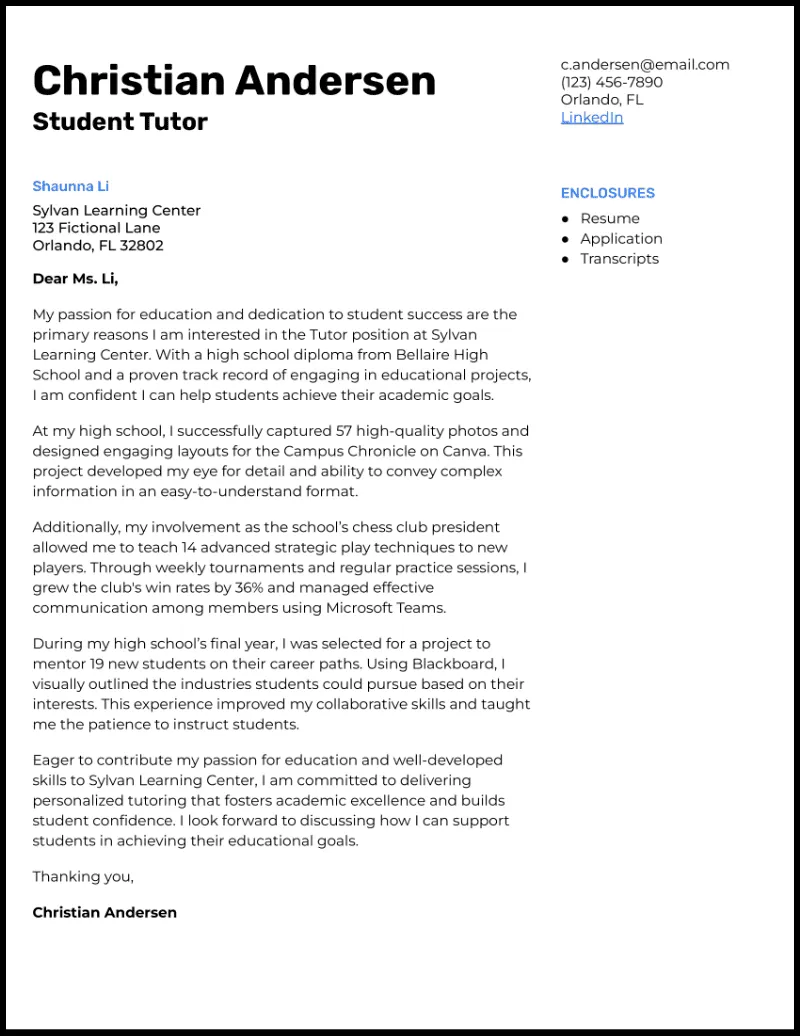Why a Cover Letter Matters for High School Grads
As a high school graduate stepping into the professional world, a well-crafted cover letter can be your golden ticket. It serves as your personal introduction, going beyond the details in your resume to highlight your unique value proposition. Unlike more experienced candidates who may rely heavily on their work history, high school grads often need to showcase potential and enthusiasm. A cover letter provides the perfect platform to demonstrate these qualities, making a strong first impression and setting you apart from other applicants. It’s your chance to tell a story, explain your aspirations, and illustrate why you’re the ideal fit for the opportunity. With the right approach, your cover letter can effectively bridge the gap between your academic achievements and the employer’s needs, ultimately increasing your chances of landing an interview and securing the job.
Highlighting Your Skills and Achievements
For high school graduates, the focus of your cover letter should be on highlighting skills and achievements that demonstrate your potential. Since you may lack extensive work experience, emphasize transferable skills gained through academics, extracurricular activities, and any part-time jobs or volunteer work. Employers seek candidates who are not only qualified but also possess traits such as dedication, teamwork, and a strong work ethic. By clearly articulating your abilities and providing specific examples, you can showcase your value and make a compelling case for why you should be considered for the position. Remember to quantify your achievements whenever possible to make them more impactful and memorable for the reader. Think about what makes you unique and the skills you bring to the table.
Skills to Showcase in Your Cover Letter
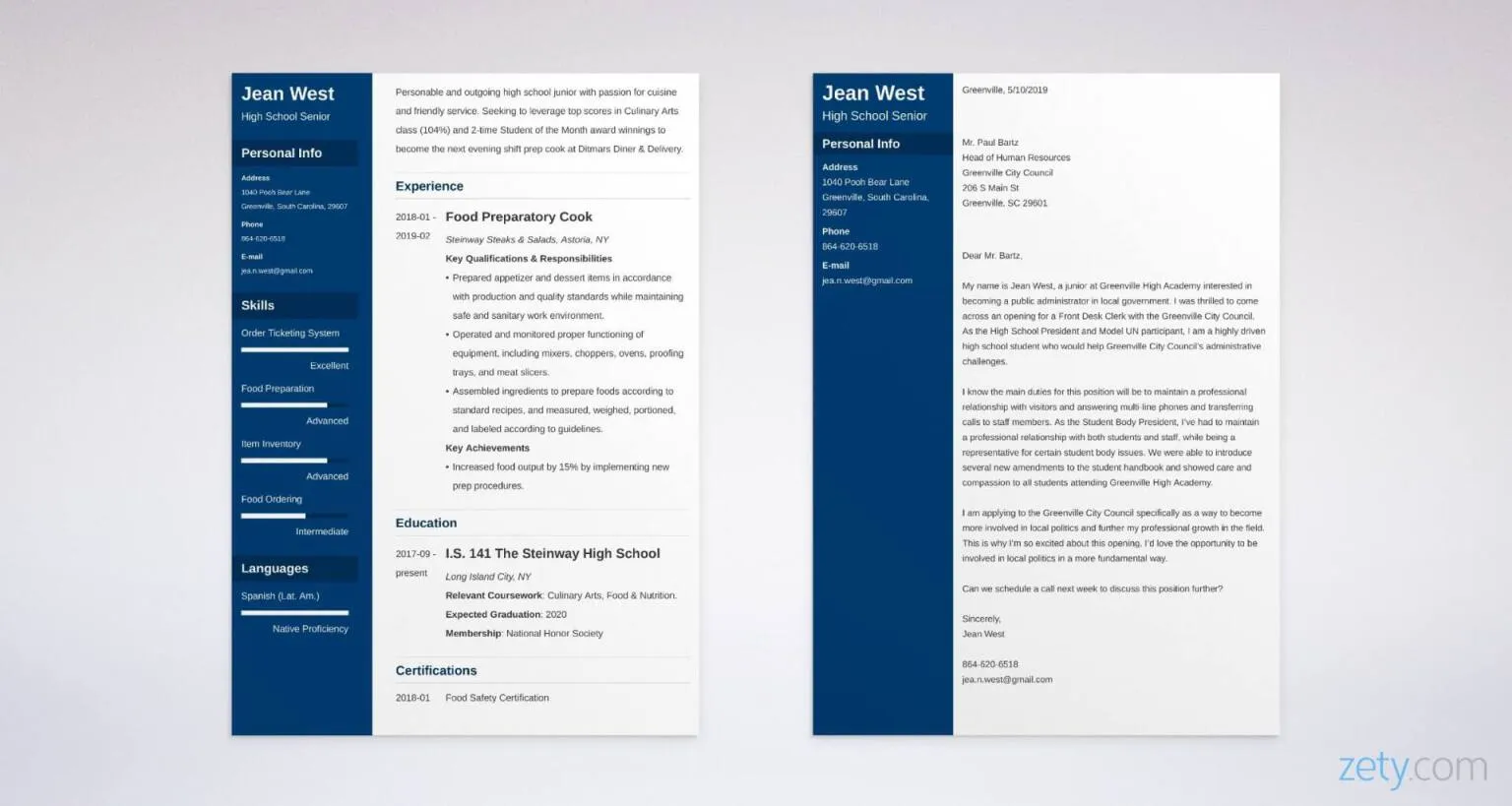
Identify and emphasize the skills most relevant to the job or opportunity you’re applying for. These might include communication skills, both written and verbal, problem-solving abilities, teamwork capabilities, time management, and adaptability. Consider skills developed through specific school projects, leadership roles, or customer service experiences. For instance, if the job requires strong communication, you might mention your experience in debate club or public speaking. If the role requires teamwork, highlight your contributions to group projects or sports teams. Make sure to back up your claims with concrete examples. Your cover letter is a platform to demonstrate that you possess the required skills and can apply them effectively in a work environment.
Academic Achievements
Your academic achievements can be highly valuable in your cover letter, showcasing your diligence and ability to learn. Include any honors, awards, or recognitions you’ve received, such as being on the honor roll, receiving a scholarship, or winning an academic competition. If you’ve taken advanced placement (AP) or honors courses, mention those as well, as they demonstrate your commitment to challenging yourself and excelling academically. While grades can be a part of your resume, your cover letter allows you to elaborate on your academic experiences and their relevance to the job. For example, you might connect your analytical skills from a math class to a role requiring data analysis or organization.
Extracurricular Activities
Extracurricular activities provide insights into your personality, interests, and soft skills. In your cover letter, describe any clubs, sports, volunteer work, or other activities you’ve participated in. Highlight any leadership roles you held, such as captain of a sports team or president of a club. These positions showcase your ability to take initiative, manage responsibilities, and work effectively with others. Mention how these activities have helped you develop skills such as teamwork, time management, communication, and problem-solving. For example, describe how your experience as a debate team member helped you improve your persuasive communication skills, which are relevant to many professional roles.
Work Experience and Internships
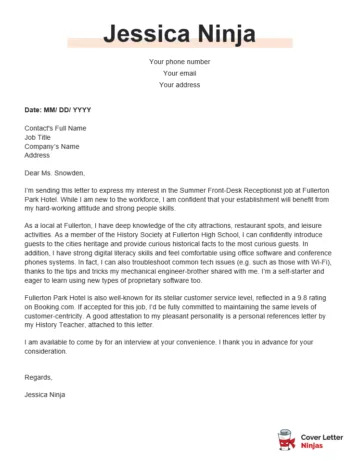
Even if your work experience is limited, make the most of any part-time jobs, internships, or volunteer roles you’ve had. Describe your responsibilities and any accomplishments during these experiences. If you worked in customer service, highlight your ability to communicate with customers and resolve issues. If you were involved in an internship, explain the projects you contributed to and the skills you gained. Be sure to emphasize what you learned and how it aligns with the job you are applying for. Consider the transferable skills gained, such as time management, organization, and professionalism. By clearly outlining your experience, you show potential employers that you are eager to work and capable of handling various responsibilities.
Formatting Your Cover Letter for High School Grads
Proper formatting is crucial for making your cover letter easy to read and professional-looking. The format should be clean, concise, and well-organized. Choose a standard font like Times New Roman or Arial, with a font size between 10 and 12 points. Use single spacing for the body of your letter and double spacing between paragraphs. Always align your text to the left, as centered text can be harder to read. Ensure you have a clear and consistent layout throughout your letter, including proper margins (typically one inch on all sides). A well-formatted cover letter signals your attention to detail and your professionalism, increasing the reader’s positive impression. Make sure to proofread your cover letter before submitting to avoid any errors.
Header and Contact Information
Your header should include your full name, address, phone number, and email address. This information should be placed at the top of the letter, either left-aligned or centered. Ensure your contact information is accurate and up-to-date so that potential employers can easily reach you. Always use a professional email address (e.g., yourname@email.com) rather than a casual or informal one. Following the header, include the date and the employer’s contact information, typically including the hiring manager’s name, title, company name, and address. Addressing the cover letter to a specific person, rather than a generic title, is an excellent way to show initiative and personalize your application, which can greatly influence the reader.
Salutation and Tone
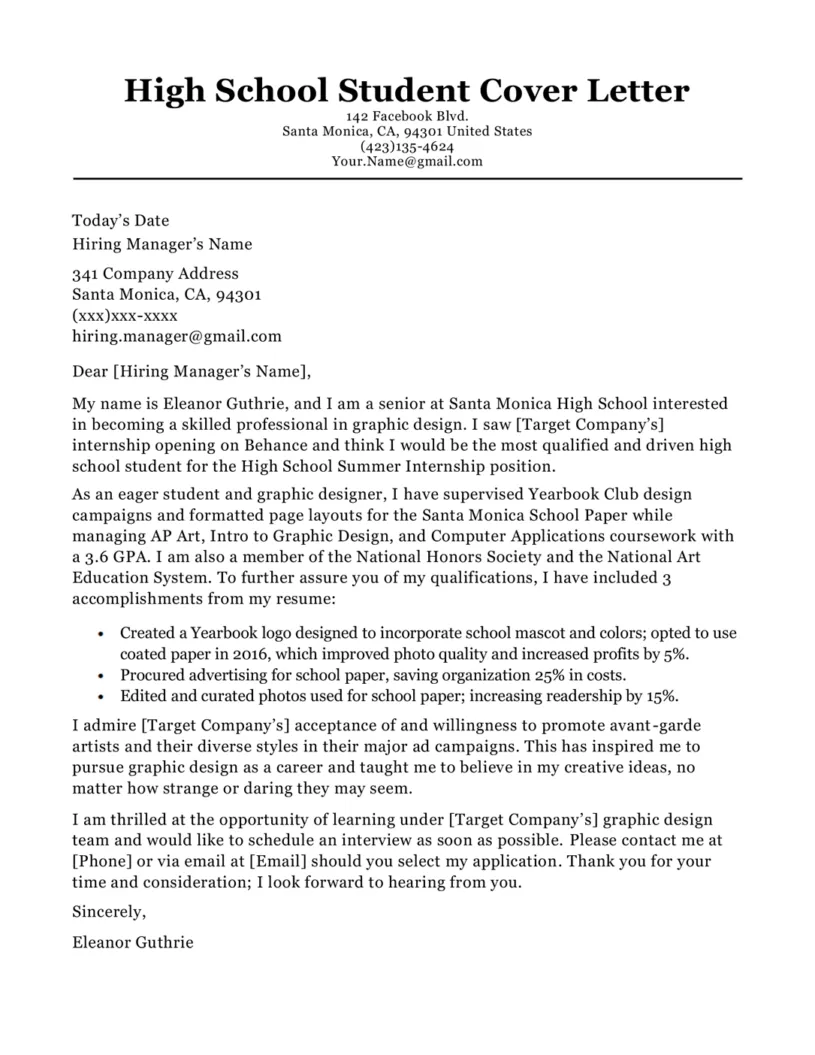
Start your cover letter with a professional salutation. “Dear Mr./Ms./Mx. [Last Name]” is generally the best approach if you know the hiring manager’s name. If you don’t know the name, using “Dear Hiring Manager” is acceptable. The tone of your cover letter should be formal, yet enthusiastic and engaging. Avoid overly casual language or slang. Show your personality and express your genuine interest in the position and the company. Ensure the language is respectful and reflects your understanding of the job and company. Maintain a positive and confident tone throughout your letter while avoiding sounding arrogant. Strike a balance between professionalism and showing your personality.
Body Paragraphs
The body of your cover letter is where you showcase your skills, achievements, and enthusiasm. The structure usually includes an introductory paragraph, several body paragraphs, and a closing paragraph. Focus on highlighting your relevant skills, experiences, and accomplishments, relating them directly to the job requirements. Use specific examples and quantify your achievements whenever possible to show your impact. Keep your paragraphs concise and well-organized, making it easy for the reader to understand your qualifications. Each paragraph should focus on a single idea, backed up by evidence, which enables you to effectively tell your story and convince the employer of your suitability for the role.
First Paragraph: Grab Attention
Start your cover letter with a strong first paragraph that grabs the reader’s attention. Briefly state the position you’re applying for and how you learned about the opportunity. Make a compelling statement about why you are interested in the role or company, or reference something specific about the company that appeals to you. For example, you could mention a recent project they undertook or their company culture. Avoid generic opening lines; instead, show genuine interest and enthusiasm. A well-crafted opening sets the tone for the rest of the letter, encouraging the reader to continue reading. Consider opening with a brief story or statement that captures your personality and highlights your qualifications.
Second Paragraph: Show Your Value
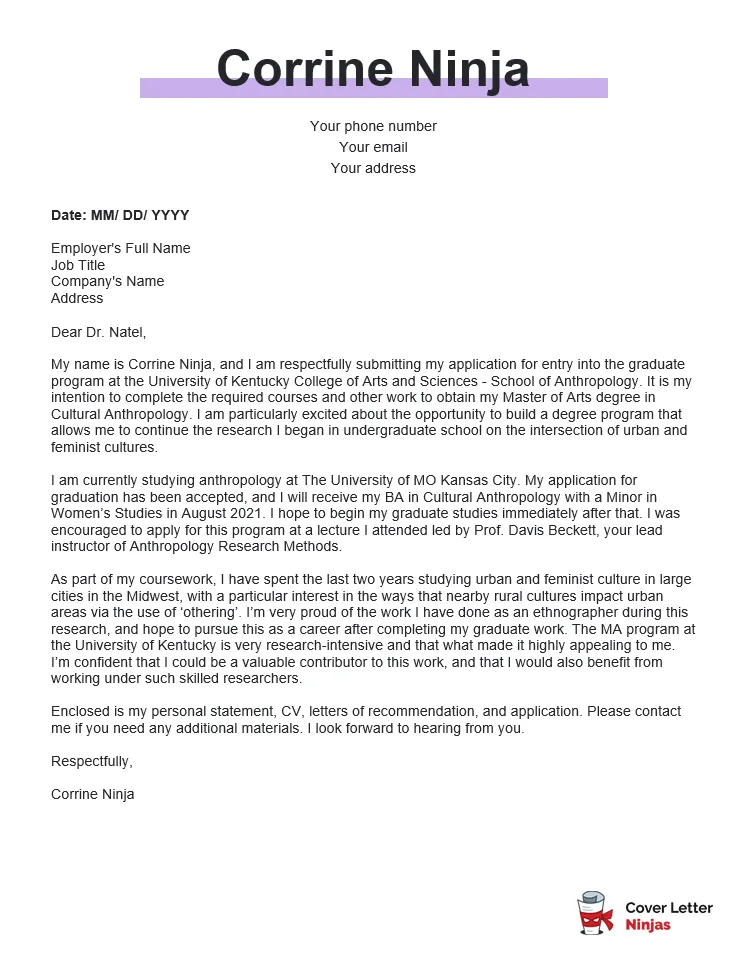
In the second paragraph, explain why you are a good fit for the job. This is where you showcase your skills, experiences, and accomplishments, directly linking them to the job requirements. Review the job description carefully and identify the key skills and qualifications the employer is seeking. Then, provide examples of how you have demonstrated those skills in the past. Use the STAR method (Situation, Task, Action, Result) to provide concise, impactful examples. For instance, if the job requires teamwork, describe a time you worked effectively in a team to achieve a goal. Always quantify your achievements whenever possible to make your impact more evident and memorable. This section should clearly demonstrate your value to the employer.
Third Paragraph: Express Enthusiasm
In the third paragraph, express your enthusiasm for the opportunity and the company. Explain what attracts you to this particular role or organization. Research the company and mention specific aspects that resonate with you, such as their mission, values, or culture. Demonstrate that you understand the company’s goals and how you can contribute to them. Briefly restate your key skills and how they align with the job requirements. End with a confident statement that you are eager to learn more and discuss the opportunity in an interview. Your enthusiasm will show the employer that you are truly invested in the role and prepared to contribute.
Closing Your Cover Letter Effectively
The closing paragraph is an important part of your cover letter, offering a final opportunity to leave a positive impression. Keep it concise, professional, and focused on the next steps. Avoid phrases like “I hope to hear from you soon” or “Thank you for your time.” Instead, express your interest in an interview and your availability to discuss your qualifications further. Restate your enthusiasm and briefly summarize your key skills. Offer a clear call to action, such as mentioning that you are available for an interview at their earliest convenience. Make sure to provide your contact information one last time, ensuring the reader can easily reach you.
Professional Closing and Signature
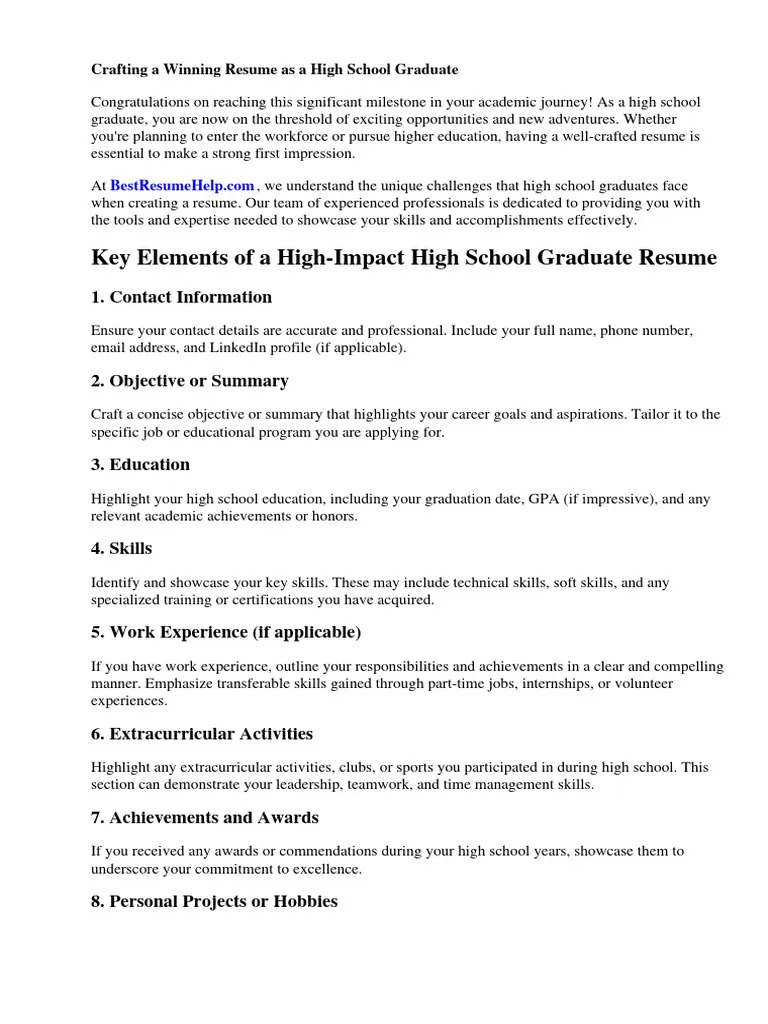
Use a professional closing such as “Sincerely,” “Respectfully,” or “Best regards,” followed by a comma. Below the closing, leave space for your signature. If you are submitting a digital cover letter, you can type your full name; otherwise, sign your cover letter with a pen. A well-executed closing reinforces your professionalism and leaves a lasting impression. Ensure your name is legible and easy to read. Your signature and closing reflect your attention to detail and professional approach.
Proofreading and Editing
Proofreading and editing are critical steps in the cover letter writing process. Errors in grammar, spelling, and punctuation can undermine your credibility and leave a negative impression on potential employers. Carefully review your cover letter for any mistakes. Read it aloud to catch any awkward phrasing or sentences that don’t flow well. Use grammar and spell-checking tools, but don’t rely on them entirely. Ask a friend, teacher, or career counselor to proofread your letter as a fresh pair of eyes can often spot errors that you might miss. A polished, error-free cover letter will show your attention to detail, professionalism, and the importance you place on the opportunity.
Common Mistakes to Avoid
Be mindful of common mistakes to avoid. Avoid generic cover letters that are not tailored to the specific job or company. Avoid typos, grammatical errors, and poor formatting. Do not include irrelevant information, such as personal opinions or unrelated hobbies. Do not overuse jargon or overly complex language; aim for clarity and conciseness. Refrain from negative language or complaining about past experiences. Always be professional and enthusiastic in your writing. Avoiding these mistakes will greatly enhance the effectiveness of your cover letter, increasing your chances of being called for an interview.
Using Action Verbs to Boost Your Letter
Using strong action verbs is a powerful way to make your cover letter more engaging and impactful. Action verbs describe your accomplishments and responsibilities in a dynamic way, showing what you achieved in previous roles or activities. Begin each sentence describing an accomplishment or skill with a strong action verb. For instance, use verbs like “managed,” “led,” “organized,” “implemented,” “created,” “developed,” and “achieved.” When describing your involvement in a school project, use verbs like “collaborated,” “designed,” or “presented.” Action verbs provide clear evidence of your skills and experience, making your cover letter more compelling and memorable.
Tailoring Your Cover Letter to Each Application
Tailoring your cover letter to each job application is essential to demonstrate your interest and suitability for the specific role. Review the job description carefully and identify the key requirements and qualifications. Modify your cover letter to highlight the skills and experiences that align with those requirements. Customize the opening paragraph to show your interest in the specific company or position. Even if you are using a template, make sure to personalize each letter to reflect the specific opportunity. By demonstrating that you understand the company’s needs and have the skills to meet them, you will significantly increase your chances of getting an interview.
Examples of Cover Letters for Different Opportunities
Reviewing examples of cover letters for different opportunities can provide valuable guidance. Search online for cover letter templates for internships, part-time jobs, and entry-level positions. Note the different approaches used to highlight skills, experiences, and enthusiasm. Adapt the examples to your specific situation, focusing on showcasing your achievements and qualifications in a clear and concise manner. Consider the tone and style used in the examples and tailor your cover letter accordingly. While adapting examples, always ensure your cover letter is original and reflects your personality and aspirations. Studying a wide array of cover letter examples will give you a great starting point for your own.
